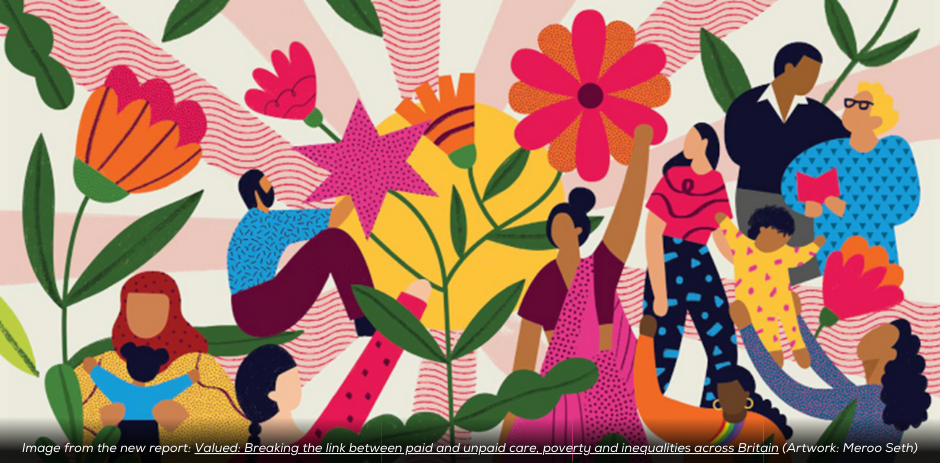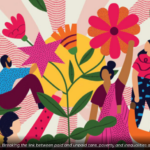By Silvia Galandini, Domestic Poverty Lead at Oxfam GB and Claire Spoors, Advocacy Adviser (UK Inequality) at Oxfam GB
Oxfam’s new paper sets out how the systemic undervaluation of care creates and deepens the link between caring and poverty, and fuels existing inequalities.
Every day, millions of people across Britain provide essential paid and unpaid care for children as well as disabled, ill and older people. Yet their huge contribution remains widely unseen, undervalued and underinvested in by governments.
Evidence produced by the many organisations who advocate for paid and unpaid carers shows that this lack of recognition continues to trap too many in a vicious cycle of poverty and hardship, exacerbated by the pandemic and the cost-of-living crisis.
- Carers UK highlighted that 34% of unpaid carers said they had cut back on essentials such as food or heating in 2023, compared to 25% in 2022 and 13% in 2021.
- Working Families found that 60% of parents and carers surveyed in late 2021 said making ends meet and raising a family had become more difficult ‘over the last three years’ – up from 45% in 2019.
- The Trades Union Congress (TUC) estimated that more than one in four children (28.4%) with care-worker parents were growing up in poverty in 2020–21.
As the vast majority of unpaid care as well as paid adult and childcare work is done by women, women are disproportionately impacted by the invisibility of care. Women who face multiple, often overlapping, forms of inequality based on class, race, disability or other identities, are worst affected.
What’s driving the under-valuation of care
The report identifies the key failing systems that continue to drive poverty among carers, which include: lack of support those with unpaid caring responsibilities to both access and remain in paid work; an inadequate social security system; poor pay and working conditions for care workers; and chronic underinvestment in social care and childcare services.
Underlying all of this are ‘sticky’ social norms, values and narratives that ignore and dismiss all care as ‘women’s work’ that is less deserving of status and financial reward; and unpaid care, in particular, as a private responsibility, rather than a collective one that should be equally shared between communities and the state, and as an activity that doesn’t matter for economic growth as it doesn’t produce any immediate monetary value.
It is time for a proactive shift in our economic approach to a model that invests in a feminist caring economy – where all care, paid and unpaid, is recognised and valued as a vital social good and a collective responsibility; unpaid care is reduced and redistributed; paid care is adequately rewarded; and all carers have a powerful voice in decision-making.
Six areas for action to transform care and carers’ lives
Across Britain, action by the Westminster and devolved governments in Scotland and Wales1 is urgently needed across six key areas, to catalyse a shift to a caring economy. They must:
- Reform the tax system and make it fair, redistributive and progressive to resource a shift to a caring economy, and to recognise and redistribute the wealth that is created and sustained by the labour of unpaid and underpaid carers.
- Increase investment in care infrastructure, and ensure that the quality and accessibility of services is prioritised over profits.
- Ensure that paid care workers across the social care and childcare sectors are paid fairly, have access to stable employment and decent working conditions, and that their skills are properly recognised.
- Strengthen the social security system for all, including those who cannot work or have to reduce their working hours due to caring responsibilities, disabilities or illness.
- Ensure adequate support for those with unpaid caring responsibilities to enable them to access, return to or remain in decent paid employment.
- Commit to transparently collect data and track progress on whether policies and spending decisions are effectively valuing and investing in all care and carers.
Transforming Britain’s care policies and systems will require political commitment and leadership, as well as a shift in the narratives surrounding care. It’s time to break the link between caring, inequalities and poverty.
1As Oxfam’s remit is limited to Britain (Scotland, England and Wales), this is the focus of the report, with evidence relevant to the constituent nations presented whenever available. In some instances, UK-wide statistics are used in the absence of data covering only Britain.
——————————————————————-
This article is featured in our 1 May newsletter and is adapted from the executive summary to the full paper: Valued: Breaking the link between paid and unpaid care, poverty and inequalities across Britain.
Want to hear about the latest poverty research, stories and events?
Stay on top of what you need to know. Sign up to our newsletter and join our powerful network of 2.6k+ professionals, volunteers and individuals actively engaged in tackling poverty across the UK.







